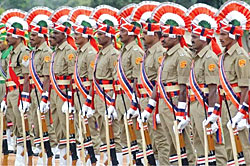 |
Democracies are strange. They are robust and seem able to survive almost anything. Venal politicians, angry or apathetic electors, floods of money from vested interests, natural catastrophe and terrorism: democratic societies take the hit and carry on.
A key element of a sturdy democracy is largely lacking across this region though, with the notable exception of India. That's the notion of a civilian-led military. Among major South Asian capitals, only New Delhi's political leaders indisputably call the shots over the men and women in uniform.
Elsewhere it's a sorry picture of covert and open military supremacy and the impact on local democratic space is palpable. Pakistan springs most obviously to mind. Impatient and imperious generals have grabbed power in that country more often than elections have been held. Not once in the country's 62 years of existence has an elected government been voted from office.
Prime Ministers lose their jobs in Pakistan when they're sacked by generals, not the people. Sometimes that's a coup, other times it's a provision put in the constitution by the army to allow a president chosen by limited franchise to dismiss an elected head of government.
Scholar Ayesha Siddiqa, in her compelling treatise, Military Inc, shows how Paksitani military officers have exploited hostility with India and American paranoia, first about Russian communism then about radical Islam, to stay firmly in charge of economic and political life in a country they're sworn to protect.
By some estimates, 75 per cent of national income over six decades has been sopped up by a force that has outlasted every major war it's ever fought. Democracy has paid a grim price and this past week's assertions by President Asif Ali Zardari that he is firmly in charge of his soldiers and spies rings as hollow as his claims of innocence in myriad corruption cases against him around the world.
There's a semblance of democracy in Sri Lanka, regular elections, high voter turnout and peaceful transfers of power from loser to winner. But the beautiful island off the southern tip of India has become the most militarised state in the region, thanks to nearly three decades of brutal civil war with the Tamil Tigers.
Sri Lanka's military and national security elite have used that conflict to increase the stature of the army and its claim on the country's limited revenues. Soldiers are armed to the teeth, serving and retired officers occupy key positions in public life and government.
Procurement budgets for everything from high tech aircraft to boot polish and rations have enriched a military-civilian nexus of middle-men and those who receive their kickbacks. A cowed media, decimated by death squads connected to high places in some shadowy way, doesn't dare to cover issues of corruption, malfeasance or atrocity.
Look to Bangladesh for another democracy badly damaged by its soldiers and their penchant for an ever-increasing share of the national polity. Democracy limps and staggers, wounded by partisan bitterness yes, but shackled to an army forged at the country's difficult birth in 1971.
One might wonder who Bangladesh's fighting men are supposed to combat if and when their country goes to war. But that question is impossible to ask of an officer corps that sees itself as guardians of ideology, and entitled to operate without civilian oversight or society's consent.
The lessons for Nepal are obvious. The Nepal Army needs to be under parliament's supervision, not autonomous or able to lay claim to a quasi-mythical status as defenders of the realm. Army chiefs and senior officers serve at the pleasure of the government of the day. But they are also apolitical and follow orders regardless.
The Maoist model of an indoctrinated fighting force may have helped the Great Helmsman abolish feudalism in China but Nepalis want sloppy civilian democracy, not military-Marxism. A nation needs its armed forces but voters and elected leaders must set the rules, budgets and mission statements, with openness and consensus building.
No side of the current argument in Nepal has this mix right. As the country's policitians struggle for power, they need to look around the region, around the world, and consider how prosperous democracies organise their affairs. In those countries, soldiers work for the taxpayer, not the other way around.
Daniel Lak's latest book is India Express, The Future of a New Superpower by Penguin



